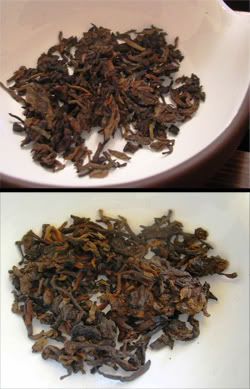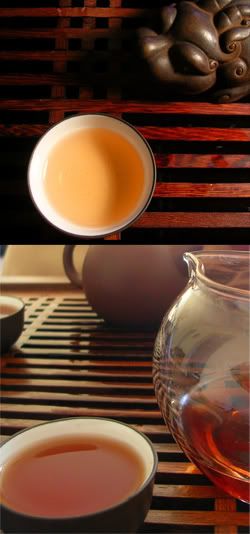 After the May Ball (congratulations to my cousin on squeezing through our lavatory window in a dinner jacket and bow tie, pre-dawn, with a 6-foot drop beneath it), we headed to Wells-next-the-Sea, pictured right - a remote, uncompromising, but ultimately very pretty town on the east coast of England. Tea consumption was limited to great drafts of Assam with "traditional English breakfasts", synonymous world-wide with immense quantities of bacon, sausage, and black ("blood") pudding. Delicious. It seems that we're not all that distant from our Saxon ancestors, after all.
After the May Ball (congratulations to my cousin on squeezing through our lavatory window in a dinner jacket and bow tie, pre-dawn, with a 6-foot drop beneath it), we headed to Wells-next-the-Sea, pictured right - a remote, uncompromising, but ultimately very pretty town on the east coast of England. Tea consumption was limited to great drafts of Assam with "traditional English breakfasts", synonymous world-wide with immense quantities of bacon, sausage, and black ("blood") pudding. Delicious. It seems that we're not all that distant from our Saxon ancestors, after all.While I have the pulpit, do allow me to read the notices prior to today's sermon:
i) Lisa @ TeaCuppa e-mailed me today to say that the samples were posted (on Monday, 7 May) to those joining the tea-tasting exercise. Hopefully, this means that you should have them either this week, or next week, depending on your location. Perhaps LZ and John, being in Mainland China, even have theirs already.
ii) Carla and Bill: I've just posted various samples to you (unrelated to the tasting event), so do keep an eye on your mailboxes.
And there endeth the notices. Let's drink some tea.
Today's two shupu were samples from VL - thanks again, good sir. Laotongzhi refers to "old comrade", while the "gongbing" indicates "tribute to the Emperor" status. That last one is a little tricky to justify, given the marked absence of Empire for quite some time. In the following, the Yushan and Laotongzhi Gongbing are referred to as A and B, respectively, and appear upper and lower in accompanying photographs, respectively.
Caledonian Springs @ 100C, 12cl shupu pot; ~5g of leaf; 2 solid rinses
 Dry leaves:
Dry leaves:The photograph is a touch uninspiring, but this is shupu after all - there's not a lot to see.
A: matted dark- and mid-browns, in 2cm lengths. A sweet and really rather pleasant aroma, but nothing extraordinary - again, very much like most shupu.
B: rust orange, very much like chuanhong. Decidedly standard shupu aroma.
10s, 15s, 25s, 30s:
A: Rich and red, with good clarity. Well-balanced aroma carrying over from the dry leaves into the wenxiangbei - burnished sugar and treacle. This is a very decent opening flavour, with a malted texture - sweet and rich. It's decidedly pleasant - not great, but pleasant nonetheless. The aftertaste is enduring, with currants and sultanas. The leaves have the aroma of Chinese red dates.
 B: "sweet, almost like syrup". Thick muscavado sugar in the beidixiang. Something of fresh, sprouting beans in the flavour. "Very rounded, yet not very deep - no sharpness at all." The texture is soft for a shupu. The lid-scent is "like an old Chinese medicine shop".
B: "sweet, almost like syrup". Thick muscavado sugar in the beidixiang. Something of fresh, sprouting beans in the flavour. "Very rounded, yet not very deep - no sharpness at all." The texture is soft for a shupu. The lid-scent is "like an old Chinese medicine shop".Used leaves:
It's shupu - they're dark and standard, both of a generally small grade. Conclusions are hard to draw from this most homogeneous of genres.
Overall:
A: Sweet and gentle. It's not complex or wonderful, but it is enjoyable within its class. Inoffensive, and therefore not worth buying.
B: A shallow treat. The better tea, but again not enough to actually warrant a purchase. There is simply too much better tea out there to buy Haiwan 2005 shupu.
VL has provided some accompanying notes for this pair of teas, drawing broadly similar conclusions, but observing something more noxious in the Yushan (A), which we may have avoided through being conservative.

8 comments:
Interesting tasting notes, I think I broadly agree that these teas are not complex. I think I'm not really a fan of shou after all...
Then again, "traditional English breakfast" is another concept I don't think I'll ever understand... :)
-vl.
Good to see you back and thanks for the updates.
Is there anyway to explain treacle to an American? I know it's some kind of food, but I only run across it when I'm reading Harry Potter or your blog. I don't read much British literature, otherwise I might understand what this treacle is, that you keep talking about.
Dustin: I guess you mean "treacle tart". Here is a recipe (from our beloved Beeb). Interestingly enough, there is no "treacle" (molasses) in treacle tarts - golden syrup is used. Even though I'm not British, I've spent four years of my life in the UK, and you can guess I liked it there ...
What Hobbes meant is a British way of saying "molasses".
Nice picture !
Vlad,
I find it hard to dislike shupu, simply because it is generally so inoffensive. Certainly, it is not difficult to dislike that bad shupu, but the vast majority are neither here nor there - pedestrian proletarian pu'er. Similarly, it is hard to get excited about them.
English breakfasts! Surely, the cornerstone of our existence as a nation. Though consumption, for me at least, is limited to "special occassions" (e.g., Sunday), they are an indispensable part of the fabric of Englishness. Leave the waffles and sugary cereals to the Americans, return the croissant to the Gauls, and come hither unto a world filled with grilled tomatoes, button mushrooms, streaky bacon, high cholesterol, scrambled eggs, and potential obesity. Marvellous. It's what made this country great.
Phyll,
It's good to be back. I notice from your Blog that it's Mothers' Day in the USA. This terrifies me, as it makes me think I have missed Mothering Sunday here. Each time, I (eventually) realise that it occurs several months later for you, and my blood-pressure returns to normal...
Dustin, Obda,
Well, I had no idea that this word did not translate into American!
Molasses and treacle are different - the former being dark, rich, and akin to tar; the latter being golden, sugary, super-sticky - but not quite so much as syrup, which is getting towards (unset) honey in its viscosity.
Describing tea (typically a lengxiang) as treacle means... lightly sugary (moreso than caramel), lingering, potent - but not as dark and rich as molasses.
Thank you for raising it - do please let me know if there are any further words that I am unwittingly using without realising their cultural isolation!
Philippe,
Thanks for dropping by.
Toodlepip all,
Hobbes
Wow. I always thought treacle was the same thing as molasses. Now, I know better.
You package has not yet shown up, but thank you for sending. I think I will wait until I get a few more goodies (currently on order) before I get something together for you.
Ta! And don't forget mom's day, whenever it occurs in merry old England.
-C
Treacle probably is just molasses, I bet, just to prove me wrong. The daily sense in British English, though, is as above. :)
Toodlepip,
Hobbes
Post a Comment